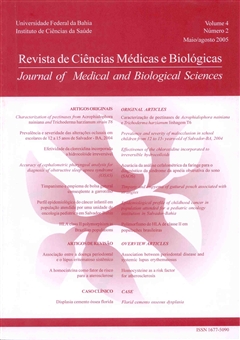Homocysteine as a risk factor for atherosclerosis
DOI:
https://doi.org/10.9771/cmbio.v4i2.4188Keywords:
homocysteine, atherosclerosis, cardiovascular disease.Abstract
Determining risk factors for cardiovascular diseases is important not only to guide correctly preventive programs, but also to identify individuals under cardiovascular risk that do not fit into any of the conventional cardiovascular risk factors: diabetes, systemic hypertension, sedentarism and smoking. In recent years, homocysteine has received great attention of cientists and several studies suggest that it may be an important cardiovascular risk factor, although some controversies remain. This paper aims at reviewig the association between homocysteine blood levels and the development of atherosclerosis, and the mechanisms by which such association manifests itself. Based upon the articles reviewed, one realizes that homocysteine blood levels have been frequently associated to the development of atherosclerosis and that, recently, enough evidence has been found to suggest this relation to be causal, direct and independent of the action of other factors. However, the clinical impact of approaches targeting a decrease in homocysteine blood leves remais to be determined by large clinical trials.Downloads
Download data is not yet available.
Downloads
Published
2005-01-02
How to Cite
Santos, D. R. D., & Andrade, G. C. F. de. (2005). Homocysteine as a risk factor for atherosclerosis. Journal of Medical and Biological Sciences, 4(2), 158–166. https://doi.org/10.9771/cmbio.v4i2.4188
Issue
Section
Review Articles
License
The Journal of Medical and Biological Sciences reserves all copyrights of published works, including translations, allowing, however, their subsequent reproduction as transcription, with proper citation of source, through the Creative Commons license. The periodical has free and free access.


